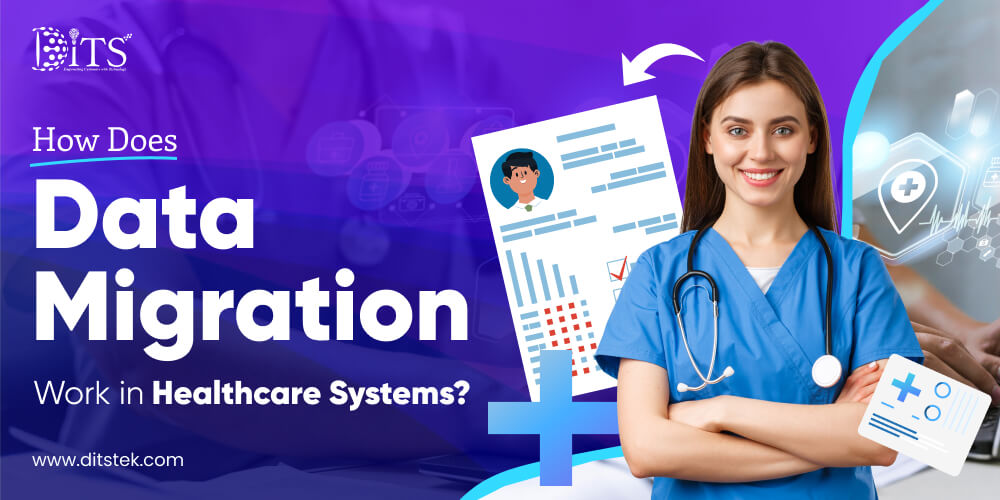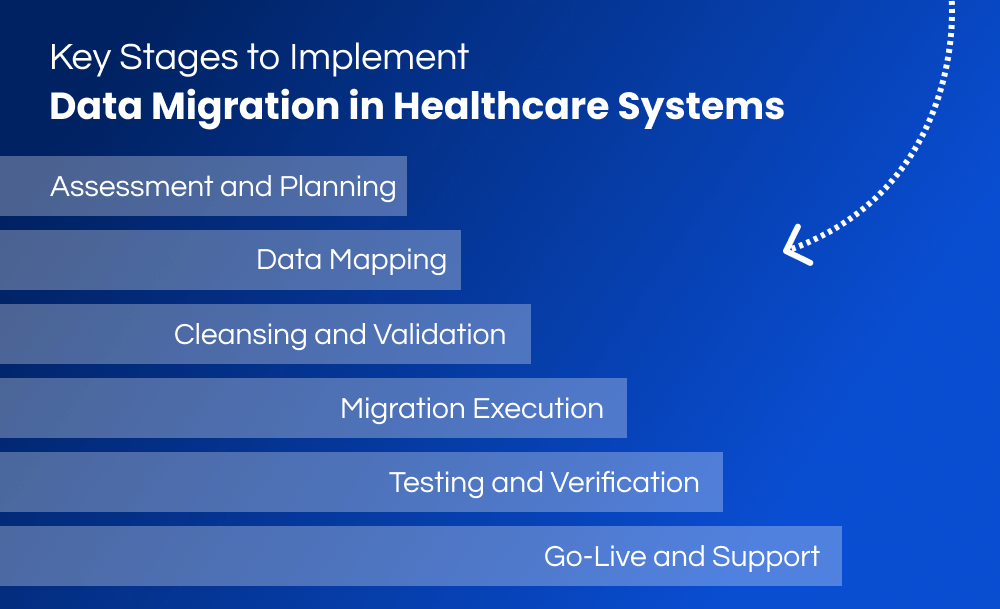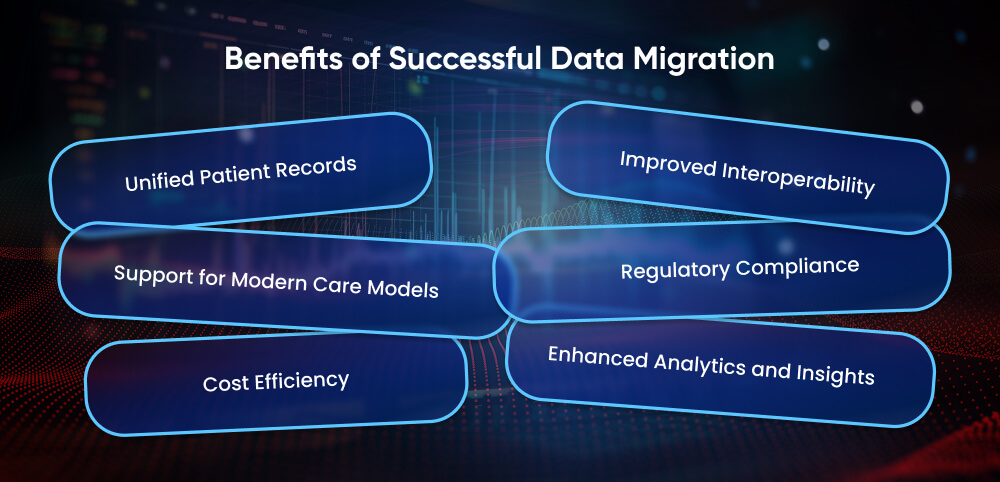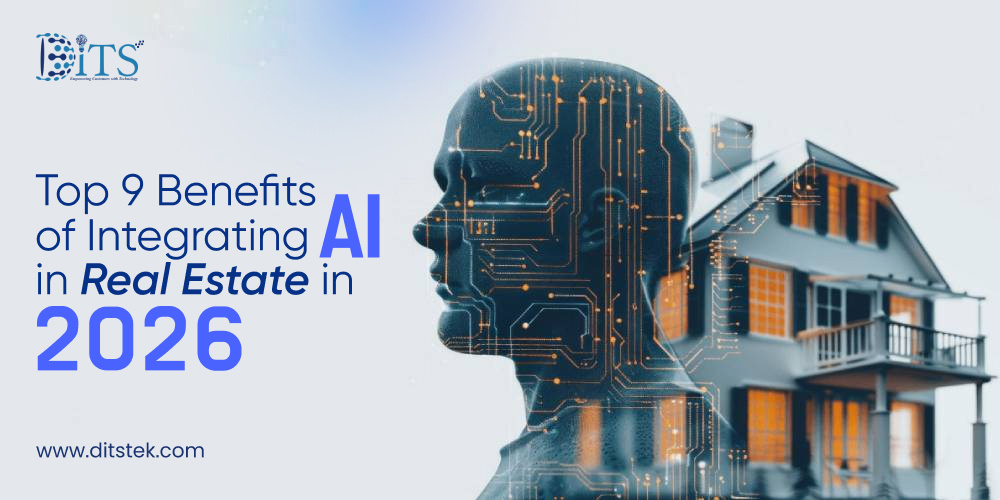How Does Data Migration Work in Healthcare Systems?
Table Of Content
Published Date :
19 Sep 2025
The healthcare sector is rapidly evolving with the adoption of electronic health records (EHRs), telemedicine, and digital platforms. As a result, organizations are dealing with an overwhelming amount of patient and operational data that must be accurate, secure, and accessible across various systems. This is where data migration in healthcare becomes essential.
Healthcare data migration refers to the process of transferring critical patient and business information from outdated legacy systems into modern, scalable platforms. For hospitals, insurance companies, laboratories, pharmaceutical businesses, and even remote patient monitoring providers, migration is the key to achieving interoperability, compliance, and efficiency.
Without a proper strategy, valuable data may remain locked in silos, hindering collaboration and slowing down decision-making. But with the right approach, healthcare organizations can ensure smooth transitions that enable better patient care, faster claims processing, and improved research outcomes. Ultimately, migration sets the stage for a future-ready healthcare ecosystem built on accuracy, accessibility, and trust.
Ready to Modernize Your Healthcare Data?
Discover proven strategies to ensure smooth, secure, and compliant data migration in healthcare. Take the first step toward transformation today.
Why Data Migration Is Critical in Healthcare
The healthcare industry generates enormous volumes of information every day, including medical records, insurance claims, laboratory results, and pharmaceutical research data. Managing this effectively requires seamless data migration in healthcare, as outdated systems often leave data trapped in silos, limiting access and reducing efficiency.
For hospitals, accurate migration means physicians can quickly access complete patient histories to make informed decisions. Insurance companies rely on clean, migrated data to speed up claims and reduce errors. Laboratories and pharmaceutical organizations also benefit from integrated systems that enable faster diagnostics and research outcomes.
In addition, regulations such as HIPAA and GDPR require sensitive patient information to be securely transferred and stored. By investing in reliable healthcare data migration solutions, organizations not only stay compliant but also build a foundation for better collaboration and improved patient outcomes.
This blog shares the role, importance, challenges, and benefits of data migration in the healthcare industry.
Key Stages to Implement Data Migration in Healthcare Systems

The process of moving data in healthcare is structured and step-by-step. Each stage ensures accuracy, security, and a smooth transition from legacy systems to modern platforms.
1. Assessment and Planning
This stage begins with a thorough evaluation of the existing systems and data in the organization. Teams analyze the volume, formats, and sensitivity of data. It then creates a migration strategy, outlining the timeline, resources, and security protocols. This step sets the foundation for the entire process by ensuring clarity before any transfer takes place.
2. Data Mapping
Here, the exact relationship between source data and the target system is defined. Teams identify fields such as patient demographics, lab results, or billing information and determine how they should appear in the new platform. Proper mapping avoids mismatches and ensures every piece of information has a clear destination.
3. Cleansing and Validation
Before migration, the data is cleaned and verified using various methods. Errors, duplicates, or incomplete entries are identified and corrected. Validation rules are applied to confirm data consistency and quality. This step prevents problematic information from being carried forward and guarantees that only trustworthy, usable records are moved into the new environment.
4. Migration Execution
The actual transfer of data occurs in this stage. Secure tools and automated scripts are used to move data from the legacy system to the new platform. During execution, monitoring is constant to detect and fix errors immediately. Partnering with experts in data migration services healthcare ensures accuracy and minimal downtime.
5. Testing and Verification
Once the transfer is complete, extensive testing is performed. Teams verify whether data has been migrated in the correct format, appears in the right locations, and remains intact. Testing may include sample checks, system integration tests, and compliance validation. This step ensures the system is ready for operational use.
6. Go-Live and Support
The new system is officially launched in this final phase. Data access is switched over for everyday use, and staff training begins. Post-launch, teams closely monitor performance, address issues, and provide support to ensure smooth adoption. Engaging experts in healthcare data migration helps stabilize operations and maintain system reliability long-term.
Is Your Legacy System Holding You Back?
Outdated platforms restrict efficiency. Learn how expert-led data migration in healthcare empowers organizations to scale without disruption.
Types of Data Migration in Healthcare
Data migration can take different forms depending on the needs of the healthcare organization. Each type addresses specific challenges, ensuring that critical data remains accessible, secure, and useful.
1. Storage Migration
This involves moving healthcare data from outdated physical storage or on-premise servers to modern solutions such as the cloud. It reduces maintenance costs, increases storage capacity, and ensures better accessibility for healthcare professionals.
2. Database Migration
In this type, data is transferred between database systems, often from older, less flexible platforms to modern, scalable ones. Database migration ensures smoother performance, faster queries, and the ability to handle growing patient records efficiently.
3. Application Migration
Here, healthcare data is shifted from legacy EHR or EMR applications into advanced systems with better interfaces and integration capabilities. This type improves usability, promotes interoperability, and enhances both patient care and operational workflows.
4. Cloud Migration
Cloud migration moves data and applications into cloud-based environments, enabling scalability, flexibility, and real-time access. It allows healthcare providers, insurers, and laboratories to share information securely, supporting innovation and future-ready healthcare operations.
Challenges in Healthcare Data Migration
While migration brings immense benefits, it also comes with unique challenges that healthcare organizations must address.
1. Legacy System Complexity
Many healthcare organizations still rely on outdated systems with rigid architectures. Extracting and transferring data from these systems requires specialized tools and expertise.
2. Large Volume of Data
Healthcare organizations manage years of patient histories, insurance claims, and lab reports. Moving such vast data sets requires careful planning and robust infrastructure.
3. Risk of Data Loss or Corruption
Even minor errors during migration can result in lost or corrupted information, making thorough validation critical.
4. Ensuring Uninterrupted Operations
Daily operations like patient care or claims processing cannot be paused. Migrations must be phased and monitored to avoid downtime.
5. Security and Compliance Concerns
Sensitive healthcare information must be protected with encryption and secure transfers while meeting HIPAA and GDPR requirements.
6. Cost and Resource Constraints
Implementing migration may require healthcare companies to make significant investments. Choosing expert-led solutions helps reduce costs while ensuring efficiency.
How Secure Is Your Data Migration Strategy?
Avoid compliance risks and downtime. Discover best practices in data migration in healthcare designed for secure, scalable growth.
Benefits of Successful Data Migration

When implemented effectively, healthcare data migration brings lasting advantages for providers, insurers, laboratories, and pharmaceutical companies.
1. Unified Patient Records
By consolidating data into a single platform, caregivers gain complete visibility of patient histories whenever required.
2. Improved Interoperability
Connecting hospitals, insurers, labs, and pharmacies fosters smoother communication and reduces duplication.
3. Support for Modern Care Models
Migration enables advanced practices such as remote patient monitoring, helping clinicians deliver timely interventions and personalized treatments.
4. Regulatory Compliance
Sensitive data is transferred securely, meeting HIPAA, GDPR, and other compliance standards.
5. Cost Efficiency
By modernizing infrastructure, organizations save on IT overhead. Expert healthcare data migration solutions ensure scalability and higher returns.
6. Enhanced Analytics and Insights
Clean, structured data enables advanced analytics for predictive care and more intelligent decisions.
Role of Technology & Best Practices
Modern technology ensures smooth and secure migration when paired with best practices.
1. AI and Automation
AI tools detect errors, automate transfers, and accelerate large-scale migrations.
2. Cloud Platforms
Cloud adoption offers real-time access, scalability, and secure collaboration.
3. Data Security Protocols
Encryption, access control, and audits ensure secure transfers.
4. Vendor and Partner Collaboration
Working with partners that provide reliable healthcare data migration service ensures minimal disruption.
5. Ongoing Testing and Validation
Regular testing verifies accuracy and compliance during and after migration.
6. Leveraging Modernisation Approaches
Integrating Legacy modernization services upgrades underlying infrastructure while migrating data.
Want to Eliminate Data Silos Forever?
Interoperability starts with effective data migration in healthcare. Connect your ecosystem for efficiency, compliance, and better collaboration.
How Different Stakeholders Benefit from Data Migration
1. Hospitals and Clinics
By adopting healthcare data migration, hospitals ensure doctors have complete, accurate patient histories.
2. Insurance Companies
Insurers streamline claims, reduce fraud, and speed approvals.
3. Laboratories
Seamless integration with hospital systems enables timely, accurate test result sharing.
4. Pharmaceutical Companies
Unified datasets accelerate clinical trials and R&D.
5. Remote Patient Monitoring Platforms
Modern migration supports custom healthcare software development for RPM, enabling real-time tracking and timely interventions.
6. Healthcare Ecosystem
Migration fosters collaboration across all stakeholders, improving care delivery and efficiency.
Why Choose DITS for Healthcare Data Migration
Choosing the right partner for migration is crucial for companies, and DITS stands out as a trusted technology provider for healthcare businesses. Our approach is built on innovation, expertise, and a deep understanding of industry challenges.
At the core of our services, we leverage AI software development for quality assurance, maintaining code quality, and customization. This ensures every migration project we handle is accurate and tailored to client's needs.
DITS offers a comprehensive healthcare data migration service that covers every stage of the process, from assessment and planning to testing and post-go-live support. Our team has proven expertise in Legacy application migration, enabling organizations to move away from outdated systems while modernizing their overall infrastructure for better scalability and performance.
We also recognize that every healthcare organization has unique workflows, so we specialize in delivering custom software development that aligns with clinical, administrative, and business processes.
Our solutions are designed to meet HIPAA, GDPR, and other global regulations, ensuring that sensitive patient information remains protected at every step. With years of experience serving hospitals, insurance companies, pharmaceutical firms, and healthcare businesses, DITS has built a strong track record of delivering safe, scalable, and future-ready migration solutions.
Need a Trusted Partner for Migration?
With proven expertise in healthcare data migration, we deliver secure, customized, and regulation-compliant transitions tailored to your needs.
Conclusion
The growing complexity of healthcare systems makes data migration a necessity. By transferring critical information securely into modern platforms, organizations achieve efficiency, compliance, and interoperability.
With the right strategy, tools, and partners, data migration in healthcare unlocks opportunities for innovation while protecting sensitive information. Partnering with DITS helps organizations embrace transformation confidently, ensuring their systems are ready for the digital future of healthcare.
FAQs
1. What is data migration in healthcare?
Data migration in healthcare is the process of transferring patient and operational data from outdated systems into modern platforms for better accessibility, compliance, and interoperability.
2. How does data migration work?
It follows structured steps—planning, mapping, cleansing, execution, testing, and go-live—to ensure accurate, secure, and disruption-free transfers.
3. Why is healthcare data migration important for insurance companies?
It improves claim accuracy, fraud detection, and processing speed, enhancing compliance and collaboration with providers.
4. What challenges can occur during healthcare data migration?
Challenges include large data volumes, legacy formats, data loss risks, and compliance requirements. Expert-led healthcare data migration solutions help overcome these effectively.
5. How long does a healthcare data migration project take?
Small projects may take weeks, while enterprise-level migrations may require months depending on scope and complexity.
6. Can data migration support remote patient monitoring platforms?
Yes. Migration enables integration of device data for real-time sharing and timely interventions.
7. How can DITS help with healthcare data migration?
DITS provides tailored data migration services healthcare, supported by AI-driven tools and modernization expertise, ensuring smooth, secure, and future-ready transitions.

Nidhi Thakur
With more than 19 years of experience - I represent a team of professionals that specializes in the healthcare and business and workflow automation domains. The team consists of experienced full-stack developers supported by senior system analysts who have developed multiple bespoke applications for Healthcare, Business Automation, Retail, IOT, Ed-tech domains for startups and Enterprise Level clients.
Recent Posts

Explore predictive maintenance software features that reduce downtime, cut costs, and boost efficiency with enterprise-grade, AI-powered maintenance systems.

Benefits of AI in real estate include better cash flow planning, improved marketing ROI, stronger pipeline visibility, and scalable growth.

We at DITS offer custom Population Health Management Software Solutions to help you measure the effectiveness and efficiency of care delivery to patients. Read our blog to know in detail.